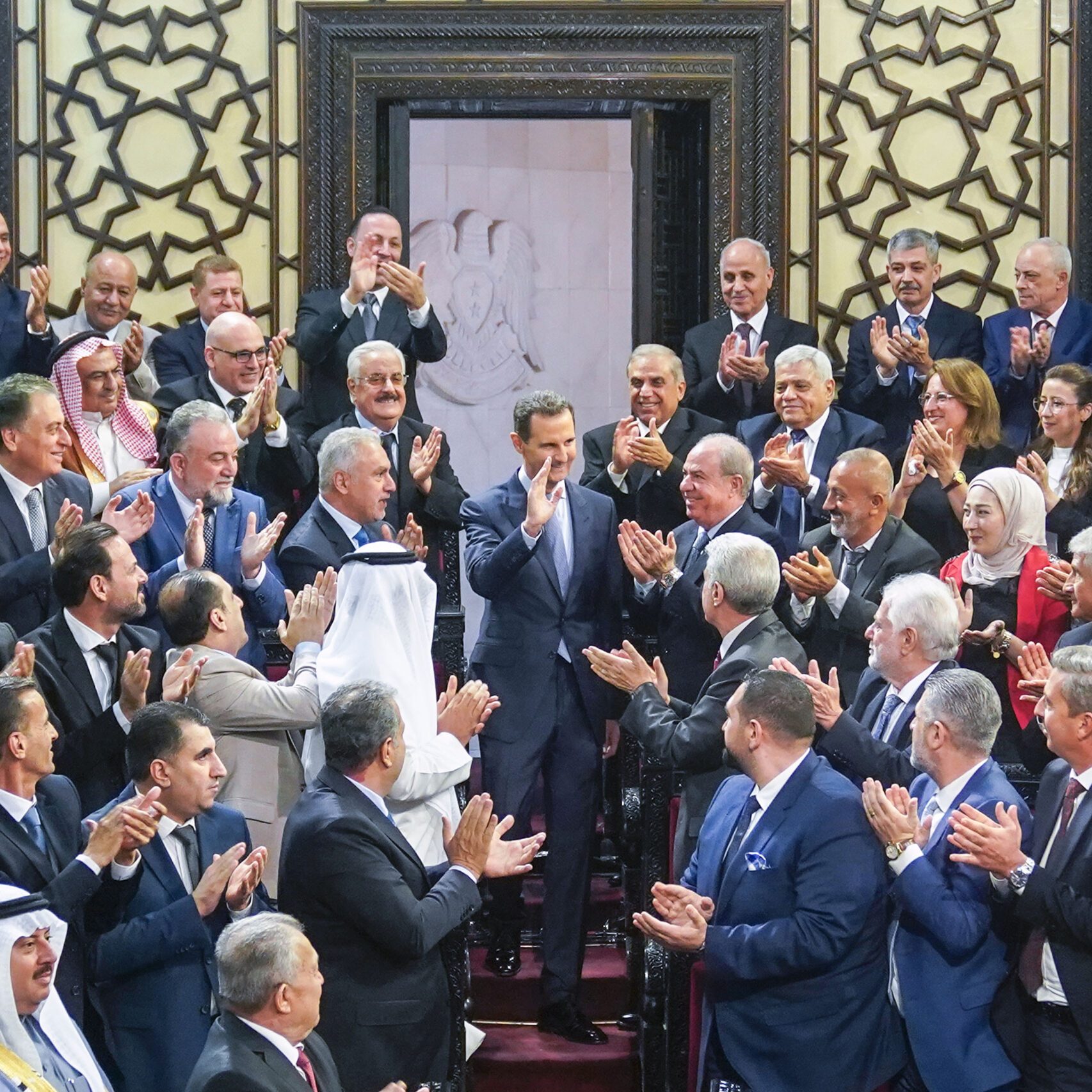President Bashar al-Assad emphasized that the People’s Assembly is the most crucial institution within the State. However, he noted that its impact will not be truly felt unless development is comprehensive across all state institutions, reflecting the strong relationships between them.
“Dear members of the People’s Assembly, I congratulate you on the commencement of the fourth legislative term. You have earned the trust of your voters and the honour of serving them. Let us remember that public trust is a resource that quickly depletes if it is not sustained through hard work, achievement, and results,” President al-Assad said Sunday in his speech before the Assembly on the occasion of the opening of the fourth legislative term.
President al-Assad clarified that immunity does not imply being above the law; rather, it means that MPs should lead by example in adhering to and implementing the laws for which they are responsible. “The role of the People’s Assembly is to question the tools when it approves a law or policy. If it fails to inquire about implementation, it shares responsibility for any negligence along with the executive authority,” the President stated.
He added that while institutions should be protected, officials must be held accountable, as accountability is a responsibility before it is a position of authority.
“You are tasked with discussing visions, which requires you to have clear visions yourselves. This necessitates a well-defined methodology that prevents individual efforts from undermining institutional work,” the President continued.
President al-Assad emphasized that individual actions, no matter how correct, would be ineffective if not aligned with broader policies and visions, particularly in the Assembly’s relationship with the executive authority.
Facing Economic Realities: Assad Calls for Pragmatic Solutions
Regarding the economic situation, the President stated that the priority in such challenging circumstances is not merely to reassure or boost morale, although that is important, but rather to present the reality as it is, analyze it, and propose viable solutions.
“Severe economic crises are like a state of immunodeficiency that is invisible to the naked eye, and wars expose this underlying weakness and its severity. We must thoroughly examine the economic policies we have pursued over decades,” President al-Assad said.
He questioned whether any single policy could remain correct in the face of changing regional and global dynamics, including shifts in economic, political, security, and cultural rules. “We must critically assess our policies,” the President added.
President al-Assad affirmed that the government must achieve its objectives within the established policies. He noted that the government requires the right tools to implement these objectives, which might include changing some policies.
President Assad stated that Syria must identify the most appropriate and least harmful solutions for its current challenges. He acknowledged that every solution has both negative and positive aspects, but emphasized that difficult choices do not imply impossibility. Instead, they require that visions, policies, and plans be grounded in facts.
The President underscored the importance of supporting small and medium enterprises, highlighting them as a crucial part of the economy. He stressed that small enterprises are the nucleus of growth, not merely a temporary fix, but the backbone of the economy.
Foundational Principles and Sovereignty: Assad’s Strategy for Syria’s Future
Regarding relations with Turkey, President al-Assad noted that the current situation is part of a broader global crisis, which necessitates swift action to mitigate damage. He referred to the initiatives proposed by Russia, Iran, and Iraq concerning Syria’s relationship with Turkey, and explained that the situation must be addressed without letting past grievances impede progress.
“With each day that passes without progress, the damage accumulates on both the Syrian and Turkish sides. In approaching these initiatives, we have adhered to our principles and interests, which typically align with those of neighboring countries when intentions are sincere. Sovereignty and international law are consistent with the principles of all parties that are serious about restoring the relationship, and combating terrorism is a shared interest for both sides,” President al-Assad remarked.
He further stated, “We did not occupy the territory of a neighbouring country to later withdraw, nor did we support terrorism only to cease that support. The solution lies in being honest and identifying the root causes of the problem, not in arrogance. How can we address an issue without understanding its true causes? Restoring relations requires first removing the factors that led to their deterioration, and we will not relinquish any of our rights.”
President al-Assad emphasized the need for a clear reference point in any negotiation process, attributing the lack of results in previous meetings to the absence of such a reference. “Syria consistently emphasizes the necessity of Turkey’s withdrawal from the territories it occupies and the cessation of its support for terrorism,” he asserted.
He also pointed out that Syria is currently focused on establishing foundational principles, as their success will lay the groundwork for future progress. He dismissed the statements of Turkish officials as baseless, reaffirming that Syria’s criterion remains sovereignty.
President al-Assad praised the citizens of the occupied Syrian Golan, stating that they have provided invaluable lessons by demonstrating that the absence of sovereignty over their land does not diminish their patriotism. Instead, it elevates it. He emphasized that occupying land does not mean forsaking one’s honor, and that their deep-rooted loyalty to Syria remains unwavering.
In conclusion, the President lauded the resistance movements in Palestine, Lebanon, Iraq, and Yemen, describing them as role models on the path to liberation, dignity, honor, and independence.
This article was translated and edited by The Syrian Observer. The Syrian Observer has not verified the content of this story. Responsibility for the information and views set out in this article lies entirely with the author.


